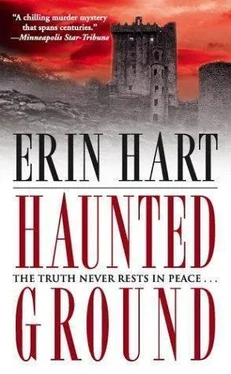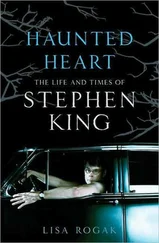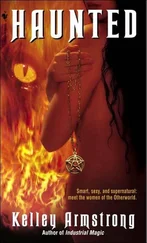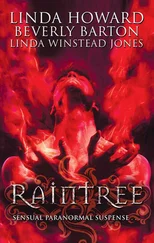The pub door opened, and who should appear again but Donal Barry. “There’s one more thing I forgot to mention,” he said, coming up beside Devaney and leaning forward on the bar. “Probably nothing, but you never know. There was one day when I was in the kitchen, one of the very first days after the disappearance. Lucy Osborne sets a plate of biscuits in front of me, right, and all of a sudden the stone drops right out of her ring. Huge fuckin’ diamond. And along with it comes a little shower of dried clay. I think nothin’ of it, and she brushes it away, sayin’ something about how she’ll have to give up digging in the garden.”
“What’s so strange about that?”
“My mam’s a great gardener. Colossal. Never gets the clay out from under her nails. Now, hanging about that place, I saw Lucy Osborne working in the garden plenty of times. And she always wore gloves. Always. That woman wouldn’t get her hands dirty for nothin’.”
After Barry left, Devaney checked his watch—ten minutes past five. He’d have to head off if he was going to make it to Dunbeg before Pilkington’s shut for the evening. In asking around, he’d found Dolly Pilkington had a small fiddle that might work for Roisin, and he had promised to come by the shop this evening to have a look at it.
Mullins had dutifully phoned this morning with the information he’d been checking. The scene-of-crime unit had found no complete fingerprints on the vehicles at Bracklyn, and nothing was missing from either car. This was going to be one of those cases where they’d never be able to prove who the perpetrator was—but they had to look as though they were making an effort. Mullins also reported that Hugh Osborne had indeed been on the seven o’clock British Airways flight from London on Sunday morning, just as he said. Fine. There was no reason for him to interfere with his own project. Maguire had a point: if whoever it was wanted to stop the priory development, why not actually put a spanner into the works at the site itself? Besides, there was fury in the way the damage had been done, Devaney thought. This wasn’t just some calculated, bog-protest publicity stunt, it was personal. So why target a couple of strangers? Could they just have been in the wrong place—too near the real target? What was it Osborne had said, that his car might have been damaged as well if he’d been at home?
And then there was Dr. Gavin’s mysterious dead crow. He didn’t want to disbelieve the woman, but he’d checked all around the house and found nothing to support her story. He agreed with her assessment of Jeremy Osborne: the boy’s destructive tendencies seemed more inward-than outward-directed. But his mother was terrified that he’d actually done the damage; you could see it in the way she looked at him. What did that say about how they were getting on? The word overprotective wasn’t strong enough for Lucy Osborne.
And then there was Brendan McGann, with straw in his clothes, broken Guinness bottles on the footpath, and a story about coming straight home to bed after the pub. Devaney made a mental note to have a word with Dermot Lynch tomorrow at the session, to ask if there was anything unusual about Brendan’s behavior Saturday night.
Devaney pulled up in front of Pilkington’s just as Dolly was locking up the old-fashioned double doors. She opened them again to greet him. “How are ye, Detective? I was just thinking you weren’t going to make it.”
“Sorry, Dolly—busy day.”
“I heard about the goings-on at the big house yesterday.” She clucked and shook her head. “Shockin’—I’d be terrified, livin’ in a huge wreck of a place like that. Have you any idea at all who did it?”
“We’re pursuing a few lines of inquiry,” Devaney said. It was what he always said, even when they had caught the doer of the deed red-handed. Besides, if he told Dolly Pilkington anything, he could be sure the whole town would have some version of it in a matter of minutes. Oliver Pilkington’s head appeared from around the corner of the back room, as he looked to see the person his mother was addressing. He squeezed past them and busied himself sweeping out the shop, sticking close enough to hear what they were saying.
“Ah, sure, we’ll never get so much as a midge’s dinner out of you, will we, Detective?” She opened the small fiddle case on the counter. “Well, here it is. Poor Oliver hasn’t a note in his head—sure, you may just as well try teachin’ music to a lump of stone. Try it out there, if you like.” Devaney picked up the diminutive fiddle and put it to his shoulder, leaning his head over the body, the better to hear its voice as he pulled bow across string.
“Got a good tone.” He plucked the strings, and held the instrument up to the light, to check the varnish and the straightness of the neck and sound post. “Could I have Roisin try it as well, to see if it suits her?”
“Surely. Keep it as long as you like, Detective.”
Devaney set the fiddle back in its case and began to examine the hairs on the bow. “You’ve lived in Dunbeg a long time, Dolly.”
“Born and reared.”
“I imagine you hear both sides of every quarrel. Like it or not.”
“Ah, there’s some of that, you know. The secret of staying in business is listening to what people say and keeping it to yourself.” She nodded wisely.
“So you might have heard a theory or two about what happened at Bracklyn House last night.”
Dolly Pilkington’s face lit up, and he knew she was about to ignore her own sage advice. “You won’t have to look very far to find the culprit.”
“Is that so?”
“Maybe only as far as across the road, they say.”
“I understand Brendan McGann’s dead against the development at the priory. Can’t be easy when his sister is keeping company with your man.”
“Keeping company, indeed,” Dolly snorted. She glanced at Oliver and leaned forward. “There are some saying he’s going to sue.”
Devaney must have looked blank.
“For maintenance,” she said, and raised her eyebrows. “For the child.”
“His sister’s child?”
Devaney heard a snigger and saw Oliver Pilkington’s gingery head lift slightly. “Sure, everybody knows Aoife McGann is Hugh Osborne’s bastard,” the boy said, and almost before the words were out of his mouth, Dolly had whirled and delivered a resounding slap to the back of her son’s head. Oliver dropped his broom and made a dive away from his mother to avoid another clout, then stood a short distance away, rubbing his head and scowling.
“Go away out of that, you dirty boy,” she said, brimming with indignation. “I won’t have that kind of talk in here.” It was plain that Oliver had heard this very phrase on his mother’s lips, and was shocked to be dealt with so severely when he simply repeated it. Devaney was sorry to make the boy suffer for his benefit.
“It’s a few years ago, now, but you know how people go on,” Dolly Pilkington said. She offered a sniff of disapproval. Devaney’s mind began turning over this new information. Of course he’d heard the current whispers around the town about Hugh Osborne and Una McGann, but he couldn’t believe he hadn’t heard the whole story. Even the children of Dunbeg took it as fact. Perhaps his own children. He thought of Brendan’s bowed head and clasped hands as he sat in the church pew, of the crude letters carved inside the confession box. If Una McGann had had a child by Hugh Osborne, that might put Mina’s disappearance in a whole different light.
When they returned from their expedition to the tower, Cormac found a note slipped under his door. He read it in a glance, and hurried down the hall to Nora’s room.
“Message from Ned Raftery,” Cormac said when she’d answered his knock. She was daubing at the scratch on her forehead with antiseptic. “Just says to ring him back; he may have found something on our red-haired girl.”
Читать дальше











